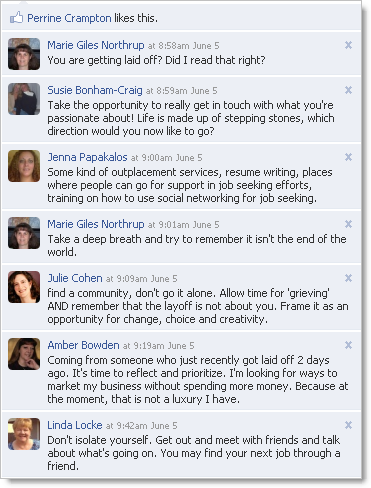I remember when I was first married (and thus, quite impressionable :p), a friend of mine made a really interesting comment, something like:
Getting laid off is way harder than getting fired.
I had no idea that years later this phrase would hit me so hard. And now I’m here to share advice with others to prepare for a layoff before you need it. When it comes, it could be a massive surprise.
His logic was that if you get fired, it’s with cause, and you can know exactly what stupid thing you did to get you fired… but if you are laid off it was because of a bigger (group?) failure, and perhaps, just perhaps, if you would have worked harder you could have avoided it. In other words, maybe it was because you weren’t working hard enough.
In 2006 I was laid-off (not fired). At some point I was elated to be out of a hellhole that I was in for three years – a hellhole that caused stress on my family, my health, my sanity… but it was a hellhole with a salary and health insurance.
As I was driving home, I was thinking of the things I would do — formulating a strategy to get through this short (HA!) period of unemployment, and land a job with a better culture, work environment, and pay than what I was leaving. I had the world at my feet, I thought, and I was going to conquer.
I had no idea what I was up against.
How to Prepare for a Layoff before it Happens
Let me share some thoughts with you, if you see the proverbial “writing on the wall.” Things have changed in the last three years, of course, as have I. These are the things I’d tell you to do if you are looking at a layoff (or job transition) in the next 12 months:
Get your resume in order. I wasted…. WASTED an entire week just looking for and then trying to recreate my resume. I had to call my university to get exact dates and names of degrees I got… I didn’t want anyone to do a reference check and find a mistake, thinking i was being fraudulent.
As an employed worker this is a terrific time to engage with a professional resume writer… sure, take a stab at doing it on your own… but starting a discussion with a professional resume writer who is in the trenches right now, and understands current resume and job search issues, will pay off.
Start getting your network in order. In humility (that means I didn’t do this for a while – until I was humble enough to drag myself to an employment center) I sat down with a volunteer career counselor. He asked me to start naming people in my network. I discounted former coworkers, customers, prospects, workers at competitive companies, and family. This really was my network, but I discounted them all for various reasons. My network list probably had three people on it. Pretty darn lame.
This exercise is a BRAINSTORM. LIST EVERYONE. Even your great grandma (who might know someone who knows someone…) … don’t discount anyone.
Put all of these people in a spreadsheet. Just start with names so you don’t get hung up on phone numbers and emails that you might have to hunt down… list names and more names and more names …. get this network down! And then import this list into JibberJobber, which is where you’ll keep track of each of these contacts, rank how well you know them, put their phone numbers, email addy’s, etc.
Start NETWORKING. The last point was to brainstorm and record. This point is to meet with people – virtually, on the phone, in person, via snail mail, whatever. Start making contact with them.
I was apprehensive about contacting someone who I hadn’t contacted in many years. I worried if they were going to wonder why the heck I was calling them (I’ve heard “Is this Amway?” before :p). I really didn’t know what I was going to say to them… how to phrase it, and how they could help me. And I didn’t want to sound like a wounded animal.
But it’s better to go through that before you are laid off than to wait until you are laid off.
Here are the three networking things you need to do SOON:
- Get on LinkedIn. This is easy, low-hanging fruit. Check out my LinkedIn courses on Pluralsight.
- Start reaching out to individuals. People on that list (the one you imported into JibberJobber) – contact them, let them know what you are up to (you don’t have to say you are going to be in a job search), and ask how you can help them. Hard? Read Never Eat Alone, by Keith Ferrazzi.
- Start attending local networking meetings for EMPLOYED people. This would be local chamber of commerce meetings, PMI chapter meetings, ASTD chapter meetings… figure out where you SHOULD HAVE been going all these years and start attending. You want to grow your local network with people in your industry or profession… and you want to get on their radar. Better to do it NOW than wait until you are in the job search.
Understand your finances. We sat down with our congregation leader, who asked us to lay out our monthly budget for him. He wanted to understand where we were at financially, and how long it would be until we needed financial help. He also wanted to see what we could easily cut out of the budget (cable, eating out, etc.). This is simple, but we aren’t budget people, so it was enlightening to understand what our financial needs were month-to-month, and when we’d run out of reserve cash.
That’s all I’m going to recommend… I don’t want to overwhelm you with a list of 20 things to do… but if you want more, I got some great advice from my Twitter network:
I like this advice from Sandyjk, because you will have time to stop and smell the roses and do some stuff you might have always wanted to do – it’s a great time to chill and help and serve. Maybe you’ll get a completely different perspective on life by doing so?
I agree, kind of… you might not be ready to announce it, or they might not be ready to handle it (you wouldn’t believe the number of people who tell me they won’t tell their dad they are in a job search – I hear this from the 40 – 50 year old, executive crowd.
I especially like her advice to establish an advisory team… very smart!
Yeppers…
That was from a “direct message” (DM) so I don’t have a link to it, but the link to the book is Get Back To Work Faster. Jill is terrific!
And the replies I got from Facebook:
Great advice…
Does this help? What else would YOU add?








Great post.
I’d like to mention a couple of things:
1) make sure you clean up your work computer and back up the important data (https://www.geekmba360.com/?p=466).
2) i’ve written a similar post called “10 things you should do before layoff”
(https://www.geekmba360.com/?p=392). There are some overlaps with your post, but your reader might find a few more suggestions.)
cheers,
Bill
I’d also add
1) Get a personal site/portfolio in order if you don’t have one. If you do, update it.
2) Start doing a job search with search sites as well. A little automation can yield opportunities.
3) Keep a list of recuiters you’ve talked to – because you’ll do it again. That’s probably part of networking, but it’s worth noting.
And before a possible layoff:
1) ALWAYS keep up on industry news. This can save you a lot of problems.
2) Keep up on local economic news. That too can be a predictor.
The post Before it Happend is exactly about me too. I was tired of connections on the Internet. I felt that I’m lost with all the ideas: face book, twitter, my space Linke’n and more. Some of them I deleted; chossen the right one for me and my business and stay stronger with.
At the mean time I learn more about marketing to avoid mistakes. From my experiences to be successful I know that be open, honest, in touch with professionals is very important to build business and connections.
Always be planning!! Before you are laid off (or quit), make copies of your work to ensure you will be able to provide samples during an interview. (Of course, proprietary info is redacted!), For example, if you write for a living (whether it’s as a journalist or sales reports), you need to be prepared to show potential employers what you’ve done and the level at which you worked. You need to start an “I AM GREAT” folder with pertinent examples of your work.
Start gathering up recommendations and commendations you’ve received via email, and put them in a Praise document or folder. You will be able to use this to provide credibility through the words of others, and you will need to refer to this often to remind yourself that you are wonderful, especially when you’re feeling down. Do this soon, because once you’re given notice, your email access gets cut off almost immediately, if not sooner.
@Daniel – good idea. That “praise document” should be JibberJobber. Here’s how:
One option is to put the person’s contact info into your JibberJobber account, and then put their recommendation as a log entry.
Another option is to put the recommendation in the Job Journal (under Tools – it’s a premium feature).
This way, no matter how many PCs you go through, or how often you move, you can always easily have access to this critical information that you should be collecting during your career.